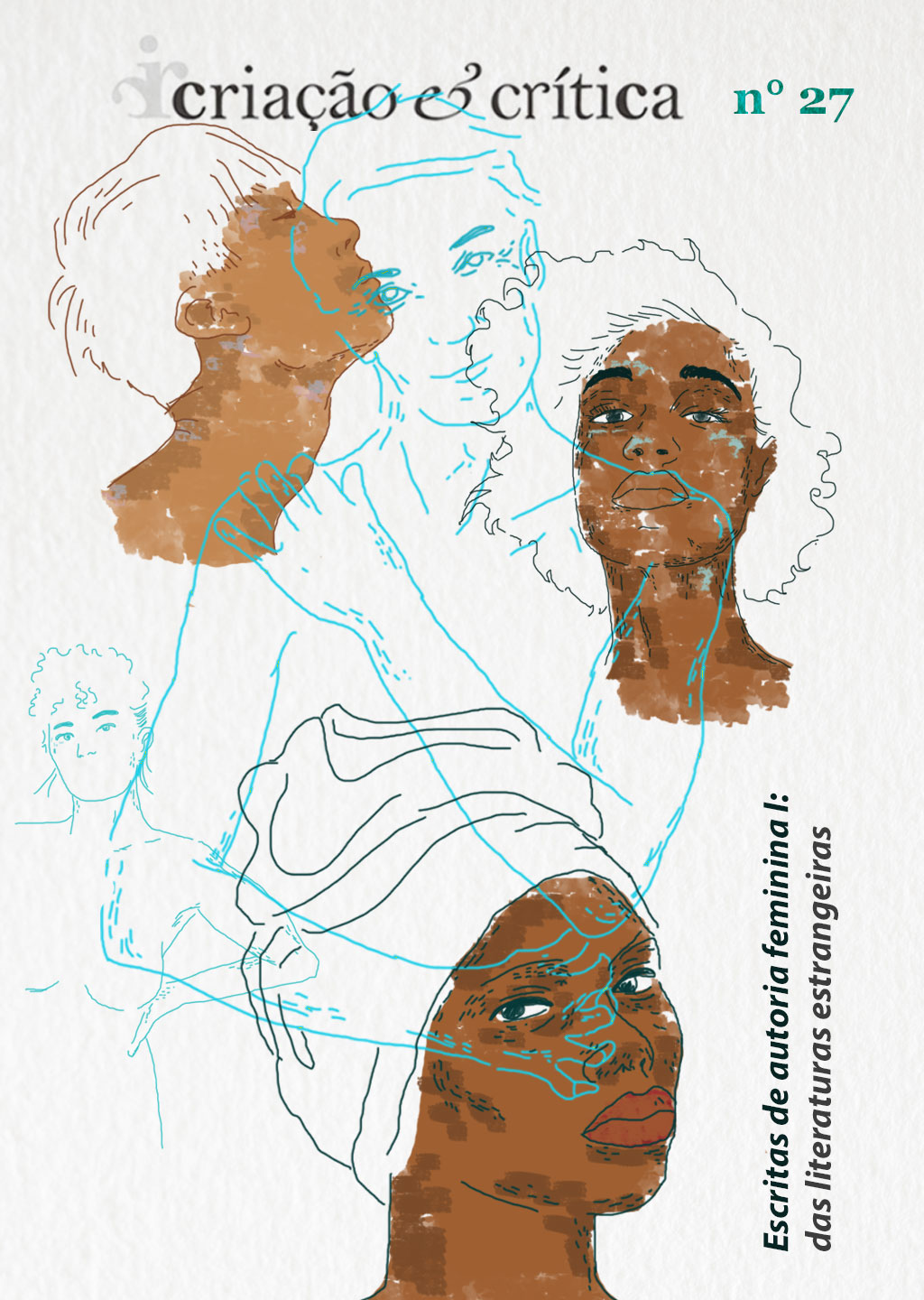Dimensions of listening in Outline feminist writing, by Rachel Cusk
DOI:
https://doi.org/10.11606/issn.1984-1124.i27p212-227Keywords:
Rachel Cusk, Outline, Listening, Gender studies, LiteratureAbstract
The article analyzes Rachel Cusk’s Outline (2019) through the discussion of the concept of listening. In the book, a character-narrator mediates a series of conversations, acting mainly through critical listening, which goes beyond ordinary stories by excavating the characters' trajectories. This listening is also close to the writing itself, pointing to metalinguistic procedures and to the writer's political-feminist position. In this sense, the idea of listening builds different types of femininity, calling for the discussion of tensions and negotiations about the granting of the voice and recovering meanings of motherhood and sexuality related to it.
Downloads
References
BARTHES, Roland. Lo obvio y lo obtuso. Imágenes, gestos y voces. Barcelona: Paidós, 1986.
CARSON, Anne. O gênero do som. Revista Serrote, Rio de Janeiro, n. 34, p. 114-136, 2020.
CUSK, Rachel. A life’s work: on becoming a mother. New York: Picador, 2015.
CUSK, Rachel. Esboço. Tradução Fernanda Abreu. São Paulo: Todavia, 2019.
CUSK, Rachel. Saldo final. Piauí, n. 143, ago. 2018. Disponível em <https://piaui.folha.uol.com.br/materia/saldo-final/>. Acesso em 17 jun. 2020.
DOHERTY, Maggie. Rachel Cusk’s struggle to break free from conventional life. The Nation, Sept. 27, 2018. Disponível em: <https://www.thenation.com/article/archive/rachelcusk-kudos/>. Acesso em 17 jun. 2020.
FREUD, Sigmund. Edição Standard Brasileira das Obras Psicológicas Completas de Sigmund Freud. Rio de Janeiro: Imago, 1996.
FLORES, Maria Bernardete Ramos. Androginia e surrealismo a propósito de Frida e Ismael – velhos mitos: eterno feminino. Revista de Estudos Feministas, Florianópolis, v. 22, n. 3, p. 815-837, dez. 2014.
GARCÍA MÁRQUEZ, Gabriel. Cómo se cuenta un cuento. Santa Fe de Bogotá: Voluntad, 1995.
GORJON, Melina; MEZZARI, Danielly; BASOLI, Laura. Ensaiando lugares de escuta: diálogos entre a psicologia e o conceito de lugar de fala. Quaderns de Psicologia, v. 21, n. 1, p. 1-11, 2019.
HOLDEFER, Camila Von. Detalhes não são banais em obra que destaca várias formas de manipulação. Folha de S. Paulo, Ilustrada, 31 ago. 2019. Disponível em: <https://www1.folha.uol.com.br/ilustrada/2019/08/detalhes-nao-sao-banais-em-obra-quedestaca-varias-formas-de-manipulacao.shtml>. Acesso em 17 jun. 2020.
JULAVITS, Heidi. Rachel Cusk’s Outline. New York Times, Book Review, Jan 7, 2015. Disponível em: <https://www.nytimes.com/2015/01/11/books/review/rachel-cusksoutline.html>. Acesso em 17 jun. 2020.
KEGLER, Paula; SANDER, Gabrielle Krupp. O silêncio em palavras mudas e ausentes: uma escuta psicanalítica. Contextos Clínicos, São Leopoldo, v. 11, n. 1, p. 122-135, jun. 2018.
KILOMBA, Grada. Plantation Memories: Episodes of Everyday Racism. Münster: Unrast Verlag, 2010.
LIBRANDI-ROCHA, Marília. Escritas de ouvido na literatura brasileira. Literatura e Sociedade, Universidade de São Paulo, São Paulo, n. 19, p. 131-148, abr. 2015.
LLOSA, Mario Vargas. Borges em sua casa. Uma entrevista de Mario Vargas Llosa. El País, Cultura, 14 jun. 2020. Disponível em <https://brasil.elpais.com/cultura/2020-06-14/borges-em-sua-casa-uma-entrevista-de-mario-vargas-llosa.html>. Acesso em 17 jun. 2020.
MACEDO, Mônica Medeiros Kother; FALCÃO, Carolina Neumann de Barros. Psychê, n. 15, São Paulo, jan.-jun./2005, p. 65-76.
NANCY, Jean-Luc. À escuta. Belo Horizonte: Chão da Feira, 2014.
NETTO, Irinêo Baptista. “Esboço” é simples na forma, mas fala de coisas difíceis. Plural, Cultura, 24 jul. 2019. Disponível em: <https://www.plural.jor.br/noticias/cultura/esboco-esimples-na-forma-mas-fala-de-coisas-dificeis/>. Acesso em 17 jun. 2020.
NOGUEIRA, Isabel Porto. Lugar de fala, lugar de escuta: criação sonora e performance em diálogo com a pesquisa artística e com as epistemologias feministas. Revista Vórtex, Curitiba, v. 5, n. 2, 2017, p. 1-20.
OBICI, Giuliano Lamberti. Condição da escuta: mídias e territórios sonoros. Rio de Janeiro: 7Letras, 2008.
OCHOA GAUTIER, Ana María. Aurality: Listening and Knowledge in Nineteenth-Century Colombia. Durham/London: Duke University Press, 2014.
REYNER, Igor Reis. Pierre Schaeffer e sua teoria da escuta. Opus, Porto Alegre, v. 17, n. 2, p. 77-106, dez. 2011.
RIBEIRO, Djamila. O que é lugar de fala? Belo Horizonte: Letramento: Justificando, 2017.
STRICK, Charlotte. How Rachel Cusk’s Outline Trilogy Got Those Iconic Covers. Lit Hub. July 31, 2018. Disponível em: <https://lithub.com/how-rachel-cusks-outline-trilogy-gotthose-iconic-covers/>. Acesso em 17 jun. 2020.
THURMAN, Judith. Rachel Cusk Gut-Renovates the Novel. July 31, 2017. Disponível em:<https://www.newyorker.com/magazine/2017/08/07/rachel-cusk-gut-renovates-the-novel>. Acesso em 17 jun. 2020.
WADE, Francesca. Interview with Rachel Cusk. The White Review, August 2019. Disponível em: <https://www.thewhitereview.org/feature/interview-rachel-cusk/>. Acesso em 17 jun. 2020.
ZULAR, Roberto. O ouvido da serpente: algumas considerações a partir de duas estrofes de “Esboço de uma serpente” de Paul Valéry. In: RIOS, Cleusa Rios Pinheiro Passos; ROSENBAUM, Yudith. Interpretações: crítica literária e psicanálise. Cotia: Ateliê, 2014, p. 213-229.
Downloads
Published
Issue
Section
License
Copyright (c) 2020 Ana Roiffe

This work is licensed under a Creative Commons Attribution-NonCommercial-ShareAlike 4.0 International License.
Authors who publish with this journal agree to the following terms:
- Authors retain copyright and grant the journal right of first publication with the work simultaneously licensed under a Creative Commons Attribution License that allows others to share the work with an acknowledgment of the work's authorship and initial publication in this journal.
- Authors can enter into separate, additional contractual arrangements for the non-exclusive distribution of the journal's published version of the work (e.g., post it to an institutional repository or publish it in a book), with an acknowledgment of its initial publication in this journal.
- Authors are permitted and encouraged to post their work online (e.g., in institutional repositories or on their website) before and during the submission process, as it can lead to productive exchanges, as well as earlier and greater citation of published work (See The Effect of Open Access).



